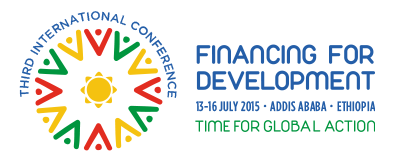Leading up to UN Member States' agreement on the Addis Ababa Action Agenda (AAAA) at the Third International Conference on Financing for Development (FfD3), African delegates advocated for incorporating African priorities into the AAAA and held events on topics such as domestic resource mobilization (DRM), industrialization and illicit financial flows.
 16 July 2015: Leading up to UN Member States’ agreement on the Addis Ababa Action Agenda (AAAA) at the Third International Conference on Financing for Development (FfD3), African delegates advocated for incorporating African priorities into the AAAA and held events on topics such as domestic resource mobilization (DRM), industrialization and illicit financial flows.
16 July 2015: Leading up to UN Member States’ agreement on the Addis Ababa Action Agenda (AAAA) at the Third International Conference on Financing for Development (FfD3), African delegates advocated for incorporating African priorities into the AAAA and held events on topics such as domestic resource mobilization (DRM), industrialization and illicit financial flows.
The AAAA, a global framework with more than 100 concrete measures addressing finance for the post-2015 development agenda and the proposed Sustainable Development Goals (SDGs), was adopted by participants on the final day of the Conference, following a compromise on international tax matters. The AAAA includes three main sections on: a global framework for financing development post-2015; action areas; and data, monitoring and follow-up.
The section on action areas includes seven sub-sections on: domestic public resources; domestic and international private business and finance; international development cooperation; international trade as an engine for development; debt and debt sustainability; addressing systemic issues; and science, technology, innovation and capacity building. Countries also agreed to establish a Global Infrastructure Forum to identify and address infrastructure gaps and opportunities for investment and cooperation.
Addressing the opening plenary, Geraldine Fraser-Moleketi, African Development Bank (AfDB) representative, emphasized that “Africa in 2015 is very different from the Africa at the turn of the century.” She explained that Africa has increased its domestic revenues fourfold in the past 15 years, as well as increased its creditworthiness and access to international capital markets.
Nkosazana Dlamini-Zuma, African Union (AU) Chairperson, also emphasized progress in Africa since 2000, saying that demographic, economic, environmental, political and social change throughout Africa provide “a window of opportunity to set ourselves on a path towards transformation, away from underdevelopment, fragility and marginalization.” She described implementation of Agenda 2063 as “an enabling and the impetus” for the post-2015 development agenda and the proposed Sustainable Development Goals (SDGs), stressing that the goal in Africa is not just to eliminate extreme poverty, but to eliminate poverty.
Africa prioritized industrialization “in a different way than what was done by the other regions” was one of its main messages at the FfD3 Conference, according to UN Economic Commission for Africa (UNECA) Executive Secretary Carl Lopes. He said Africa views inclusive sustainable industrialization as the primary path to structural transformation, adding that Africa will “make no apologies for promoting industrial policies.” Dlamini-Zuma described inclusive sustainable industrialization as central to poverty eradication and called for building infrastructure, ensuring regional integration and creating conducive business environments.
During a round-table event with the Executive Secretaries of the five UN Regional Commissions, titled ‘Regional Perspectives on Implementing an Ambitious, Transformative Sustainable Development Agenda’ and held on 14 July, Lopes stressed, “Africa has the fastest growth as a continent, but is not happy as this is a growth without quality.” Lopes emphasized that African leaders want a different take on official development assistance (ODA), which is lower than remittances or illicit financial flows (IFF) coming out of Africa, according to UNECA.
Participants also emphasized the need for reform in Africa’s tax collection during a side event. Lopes further cautioned that “we should not neglect the importance of the negative perception on Africa,” in examining potential sources of financing, adding that pessimistic perceptions may discourage investors. Panelists also recommended investments in infrastructure and social services and the diversification of income sources.
Along with the other multi-lateral development banks (MDBs) and the International Monetary Fund (IMF), AfDB also signaled their intention to work more closely with the public and private sectors to mobilize resources to support achievement of the SDGs.
A high level committee of ten African Heads of State is responsible for all post-2015 negotiations and advocates for Africa’s interests in line with Africa’s Agenda 2063, according to UNECA. The FfD3 conference took place in Addis Ababa, Ethiopia, from 13-16 July 2015. [AfDB Press Release 13 July] [AfDB Press Release 10 July] [UNECA Press Release 16 July] [UNECA Press Release 15 July] [UNECA Press Release 15 July (2)] [UNECA Press Release 14 July] [UNECA Press Release 14 July (2)] [UNECA Press Release 14 July (3)] [UNECA Press Release 13 July] [AU Chairperson Statement at FfD3 Opening] [IISD RS Story on MDBs Commitment] [IISD RS Coverage of FfD3 Conference] [FfD3 Website]